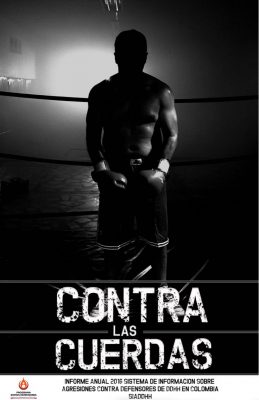
In its Annual Report for 2016 entitled, “Human Rights Defenders on the Ropes” (Contra las Cuerdas” Colombian human rights organisation Programma Somos Defensores documents 80 killings of human Rights defenders (HRDs) and 49 attempted killings in the same year in which a peace agreement was finally signed with the FARC.
Ironically even though general levels of violence in the country have decreased by 29% the number of targeted killings of HRDs has actually increased. The corresponding figure for 2015 was 63.
While the level of violence may have dropped in percentage terms Colombia still remains one of the most dangerous countries in the world in which to be a HRD with 317 instances of threats against HRDs, 80 killings, 49 attempted killings, 17 arbitrary detentions, two cases of disappearance, nine cases of arbitrary use of the justice system, 6 instances of digital attacks on human rights organisations and one case of sexual violence.
It is worth noting that of the 80 cases, 34 took place in the provinces of Cauca, Antioquia, Norte de Santander, Nariňo and Valle del Cauca. According to Carlos Guevara of Programma Somos Defensores “The vast majority of these killings took place in rural areas. The victims were mainly local community leaders who did not have a high national profile but who nevertheless played an essential role in defending the rights of indigenous, peasant and afro descendant communities, as well as the rights of women and members of the LGBT+ community.
According to Guevara “ in recent times the killers have taken a new approach. By targeting leaders at the local level they are deliberately trying to fragment and break up the human rights movement while avoiding the political cost of killing a high profile leader”.
Another key point is that more than half of these killings have been carried out by paramilitary groups even though the government tries to maintain that paramilitary groups no longer exist. Despite the fact that 500 HRDs have been killed in the last 10 years neither the government nor the State Prosecutor’s Office has recognised the systematic nature of the killings. Nor have they developed a proper system to document these cases.
Human rights defenders play a vital role in implementing the peace agreement at the local level yet at the moment they are largely unprotected.
You can find the full text of the report in Spanish here

